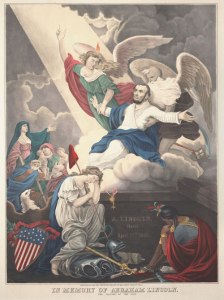 Yes, I realize the standard line is that Lincoln’s death doomed the prospects for peaceful reconstruction. However, the transformation of AL’s memory clouds the issue. His universal popularity was post-assassination. Had he lived, real challenges – a less than friendly and vengeful Congress and his conflicting (mutually exclusive?) goals of a soft policy towards former Confederates and enfranchisement of freedmen – lay ahead. And with the profound goal of military victory gone, likely to be replaced with similarly unifying feelings of mourning and blame-laying, a living AL may have had a tough row to hoe.
Yes, I realize the standard line is that Lincoln’s death doomed the prospects for peaceful reconstruction. However, the transformation of AL’s memory clouds the issue. His universal popularity was post-assassination. Had he lived, real challenges – a less than friendly and vengeful Congress and his conflicting (mutually exclusive?) goals of a soft policy towards former Confederates and enfranchisement of freedmen – lay ahead. And with the profound goal of military victory gone, likely to be replaced with similarly unifying feelings of mourning and blame-laying, a living AL may have had a tough row to hoe.
In other words, I have my doubts.
While a spotty viewing of the talking heads crowding the C-Span airwaves over the past few days indicate some slight revision to the long accepted story of Lincoln’s death robbing the south of its “best friend”, I think some confuse the reality of what happened under the watch of Andrew Johnson (who at the start was viewed by the Radicals as more of an ally than Lincoln) with the likelihood of what may have happened under that of Lincoln.
Larry Tagg, in The Unpopular Mr. Lincoln (see interview here), does a fine job of viewing Lincoln in real-time, and shows that he was far from the most popular man in America as described by Sally Field’s Mary Todd in the film Lincoln, even after Lee’s surrender. To save my weary fingers, Mr. Tagg graciously provided me with a transcript of his Epilogue, The Sudden Saint. Here’s a sample (pp 462-463):
Even men who loathed Lincoln knew they must yield to his sudden sainthood. “This murder, this oozing blood, almost sanctify Lincoln,” wrote Count Gurowski on the day he died. “His end atones for all the short-comings for which he was blamed and condemned by earnest and unyielding patriots. . . . [W]hatever sacrifices his vacillations may have cost the people, those vacillations will now be forgiven. . . The murderer’s bullet opens to him immortality.” Radical Senator James W. Grimes of Iowa, who had regarded Lincoln as “a disgrace,” glumly predicted on the day after the assassination, “Mr. Lincoln is to be hereafter regarded as a saint. All his foibles, and faults, and shortcomings, will be forgotten, and he will be looked upon as the Moses who led the nation through a four years’ bloody war, and died in sight of peace.” A journalist lamented, “It has made it impossible to speak the truth of Abraham Lincoln hereafter.”
Radical Lincoln-haters wasted no time in convening. On the afternoon of April 15, as shock mixed with grief in the North, they gathered in Washington only hours after Lincoln’s death. There, they rejoiced. “While everybody was shocked at his murder, the feeling was universal that [it] would prove a godsend to the country,” wrote George Julian, who was there. “I . . . have not in a long time heard so much profanity,” he wrote. “It became intolerably disgusting. Their hostility towards Lincoln’s policy of conciliation and contempt for his weakness were undisguised.”
Zachary Chandler, who was also there, wrote his wife, “I believe that the Almighty continued Mr. Lincoln in office as long as he was useful and then substituted a better man [Andrew Johnson] to finish the work.” Ben Wade, Henry Winter Davis, and the others present agreed, of course, as did Radicals everywhere. Oliver Wendell Holmes, when he heard the news in Boston, judged that “more than likely Lincoln was not the best man for the work of reconstruction.” Wendell Phillips assured his listeners in a memorial speech at Tremont Temple the next week, “God has graciously withheld from him any fatal misstep in the great advance, and withdrawn him at the moment when his star touched its zenith, and the nation needed a sterner hand for the work God gives it to do.”
The rightness or wrongness of these opinions is irrelevant. Keep in mind that these are not the opinions of defeated and vengeful Confederates. These are the powerful Union men, relatively more powerful in peace than in war, with whom Lincoln would have to deal for the next four years.
A tough row to hoe.

A very thought provoking post. I think that any misconception regarding a peaceful reconstruction period can be dismissed given the hatred and rancor of the time. There could not be a “utopian” return to antebellum times, without slavery, under the circumstances. On the other hand, with Lincoln at the helm it could be argued that it might have been somewhat better than the outcome we all know. He did have a way with things political…think “Team of Rivals”…that was masterful. There is no perfect solution to post war problems, but I think he would have managed the country through to better outcomes.
LikeLike
Interesting post.
I still think one of the immortal books on Lincoln and what happened surrounding his death is ‘Myths After Lincoln’ by Lewis. It gets much wrong about Reconstruction but what happened to Lincoln and his memory in the North after his death he gets perfectly right.
It would have been a extremely tough road to hoe but I’d still would have preferred Lincoln to have been able to try his hand that Johnson.
Chris
LikeLike